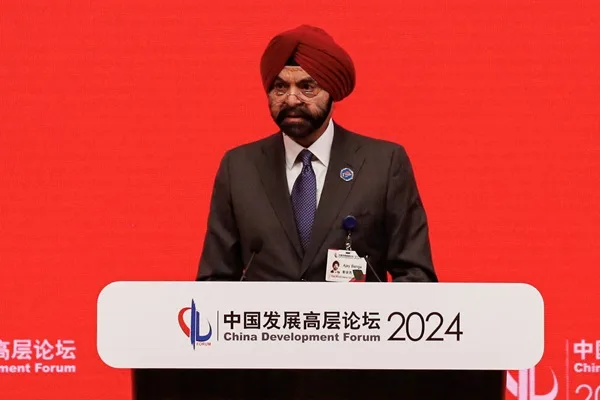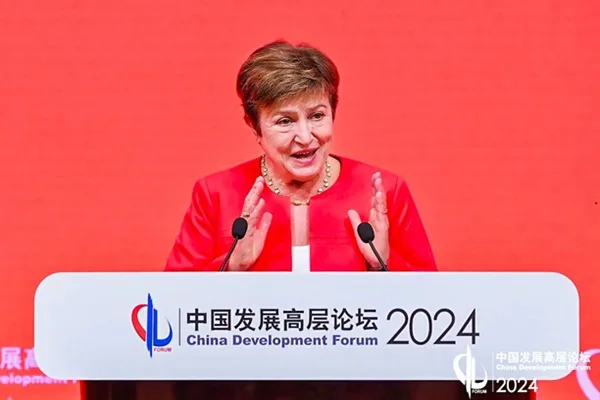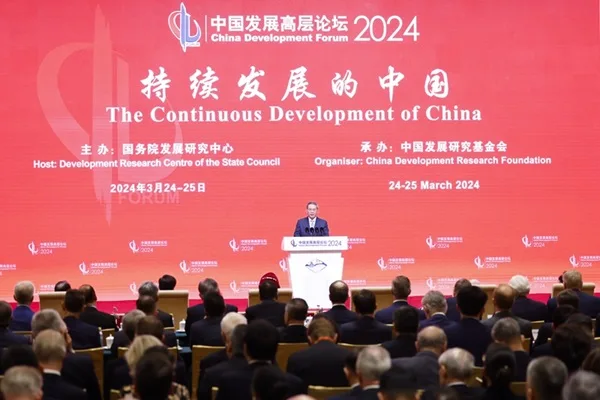China Promotes R&D to Unleash ‘New Productive Forces’
During the China Development Forum 2024 (#CDF2024), China highlighted the huge opportunities afforded by China and wooed companies to set up R&D centers in China.
The Forum is organized by the Development Research Center of China’s State Council under the premiership of LI Qiang. For his year’s edition, the theme was “The Continuous Development of China“, with an emphasis on innovative, green and sustainable development. Some 400 leaders from the public and private sectors attended the Forum. The chiefs of the World Bank and International Monetary Fund also participated in the opening session and delivered keynote speeches.

World Bank President Ajay Banja noted that China’s remarkable journey during the past five decades could serve as an inspiration to other developing countries. As a matter of fact, China successfully lifted hundreds of millions of people out of poverty to become one of the world’s largest economies. Once a borrower, China is now one of the biggest financiers behind the World Bank.
As usual, the China Development Forum comes right after the ‘Two Sessions’ and represents a concrete step for implementing economic policies. During his welcome address, Chinese Premier LI Qiang noted that China has registered a respectable 5.2% growth in 2023 to become a RMB 126 trillion (USD 18 trillion) economy. With a target growth of 5% in 2024, the Chinese economy is expected to surpass the USD 20 trillion bar by 2025.
Globally, China contributed nearly 30% of the total economic growth worldwide and remains the top exporter in terms of trade in goods worldwide. Going forward, China aspires to go up the value chain by focusing more on innovation and sustainability.
“The accelerated growth and application of new technologies has not only led the transformation and upgrading of China’s economy but also strongly supported global green development.”
Chinese Premier LI Qiang
Structurally, China has undergone a gradual but steady shift towards emerging technologies and digital industries. Strategic new sectors, or New Productive Forces as Beijing likes to call it, represented nearly 13% of GDP, compared to only 7.6% ten years ago.
In her keynote remarks, IMF MD Kristalina Georgieva stressed that China needs to “reinvent itself” by a prompt resolution of the property market crisis and to come up with economic policies to boost domestic consumption and overseas export.

In terms of future orientation, technological innovation has been earmarked as a key new strategic sector. In fact, the Chinese Minister of Industry and Information Technology, Mr JIN Zhuanglong, encouraged for foreign #HiTech firms to set up more R&D centers in China. He stated that China has a huge pool of disciplined and talented workforce and is reforming its laws to offer better Intellectual Property (#IP).
Nevertheless, China appears to face an uphill battle when it comes to attracting #FDI into the #HiTech sector. Recently, IBM closed its Research Lab in Beijing. Ericsson shut down one of its five R&D centers in China. Hulu, the streaming platform backed by Disney chopped off nearly 90% of its local staff at its Beijing R&D office.
It is to be said that recent actions and policies do not appear encouraging to foreign companies looking to expand or enter the Chinese markets. Foreign companies have reported heightened scrutiny and police raids under the alleged violation of Data Protection and Espionage laws.
Still, China managed to achieve a dominant position in the field of #EV, by controlling a 60% share of the global sales. Even Tesla’s sales come largely from China, but recently domestic player BYD has overtaken Tesla in terms of sales volume globally.
To conclude, the Chinese Premier warned against the unfavorable geopolitical climate for China; but vowed to improve the business environment for foreign companies in order to attract more investment.

